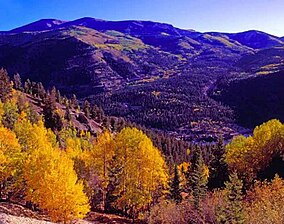| Slumgullion Earthflow | |
|---|---|
 | |
| Location | Hinsdale County, Colorado, United States |
| Nearest city | Lake City, Colorado |
| Coordinates | 37°59′30″N 107°15′25″W / 37.991665°N 107.25704°W |
| Designated | 1983 |

The Slumgullion Earthflow is a remnant of a landslide in the San Juan Mountains in Hinsdale County, Colorado. It was designated a National Natural Landmark in 1983. It is also a Colorado Natural Area and an Area of Critical Environmental Concern. [1] [2] [3]
The earthflow, a slow-moving landslide, crawled down the valley about 700 years ago creating the 4 miles (6.4 km) long and 2,000 feet (610 m) wide mass. [1] [2] The earthflow lies a few miles southeast of Lake City. [2] The landmark site covers 1,291 acres (522 ha) and is owned and managed by the US Forest Service and the Bureau of Land Management. It is "a striking example of mass wasting (the movement of large masses of earth material)." The Lake Fork of the Gunnison River was dammed by the earthflow, creating Lake San Cristobal. [1] A second earthflow has been moving continuously for about 300 years over older stable rock. [3] It moves at a rate of about 7 meters (23 feet) per year. [4]
The area is a habitat for elk and deer. [2] It is crossed by Colorado Highway 149, the principal highway of the area connecting Lake City with Creede.
References
- ^ a b c "Slumgullion Earthflow". Colorado Parks and Wildlife. Archived from the original on August 27, 2012. Retrieved July 5, 2013.
- ^ a b c d "Slumgullion Earthflow". U.S. Department of the Interior - Bureau of Land Management. Retrieved July 5, 2013.
- ^ a b D.J. Varnes and W.Z. Savage, ed. (March 23, 2012). "Bulletin 2130 -The Slumgullion Earth flow: A Large-Scale Natural Laboratory". US Department of Interior - US Geological Survey. Retrieved July 5, 2013.
- ^ Hagenauer, Beth (October 8, 2012). "NASA Conducts Airborne Study of Colorado Landslide". NASA Dryden Flight Research Center. Retrieved May 9, 2014.